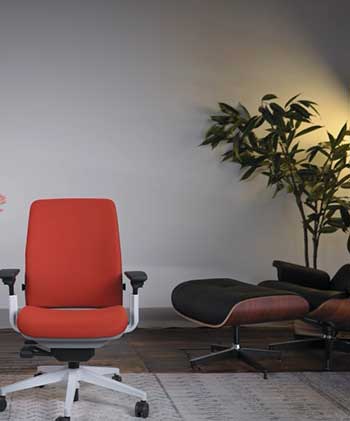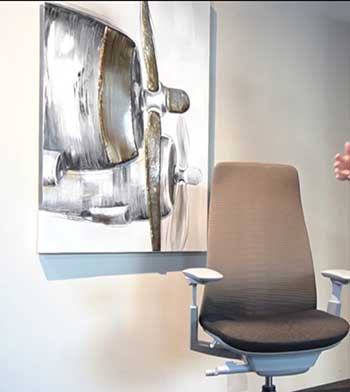If you’re in the market for a new office chair, two of the top brands you’ll likely consider are Steelcase and Haworth. Both companies have been making quality office furniture for decades and offer a wide range of chair models to suit different needs and budgets.
But which one is right for your workspace?
In this comprehensive guide, we’ll compare Steelcase and Haworth chairs side-by-side, going over the pros, cons, features, and key differences between these two industry leaders. Read on for an in-depth look at how Steelcase and Haworth stack up.
A Brief Comparison Table
| Feature | Steelcase | Haworth |
| Popular Models | Series 1, Leap, Gesture, Think | Fern, Zody, Very, Soji |
| Ergonomics Philosophy | Dynamic support that flexes as you move | Innovative materials that conform to the body |
| Lumbar Support | Adjustable LiveBack system flexes continuously | Zonal polymer grids and cushioning systems |
| Material Quality | High-grade wool blends, knits, and eco-leathers | Rhythm cloth, Buzz2 fabric, vinyl, and mesh options |
| Weight Capacity | Up to 500 lbs on some models | Up to 450 lbs on high-capacity models |
| Warranty Length | 12 years on most chairs | 5-12 years depending on model |
| Price Range | $400 – $1700+ | $400 – $1500+ |
| Best For | Proven ergonomics, larger users, uniform fabrics | Light maneuverability, mesh breathability, design variety |
Steelcase Chairs
Founded in 1912, Steelcase is one of the most established and trusted names in office furniture. The company pioneered early ergonomic office chair designs starting in the 1960s and today offers a full suite of seating for work and home offices.
Some of Steelcase’s most popular chair lines include:

- Steelcase Series 1 – An affordable, customizable chair ideal for most basic office needs. Offered in multiple colors and fabrics.
- Steelcase Leap – A high-adjustable ergonomic task chair made for all-day comfort. Features LiveBack technology that flexes with the spine.
- Steelcase Gesture – A premium ergonomic chair designed to support a range of postures and tasks. Has a responsive backrest and 3D armrests.
- Steelcase Think – A classic ergonomic chair with padded, breathable materials. Comes in executive leather or fabric upholstery.
Across their range, Steelcase chairs feature high-quality materials like steel, aluminum, and injection-molded plastics for durability.
They’re designed with adjustable ergonomic functions to promote healthy posture and circulation while sitting for long periods.
Pros of Steelcase Chairs:
- Proven history of excellent ergonomic design based on research
- Durable construction from top-grade materials
- Responsive backrests that flex as you move
- Breathable fabrics that reduce heat buildup
- Customizable configurations and upholstery options
- Market-leading 12-year warranty on most chairs
Potential Cons of Steelcase:
- Generally, more expensive than competing brands
- Limited color and fabric choices on some models
- Armrests may feel rigid on certain chairs
- Less mesh-backed options than other brands
Haworth Chairs
Michigan-based Haworth dates back to 1948 and offers a diverse array of seating for the modern office. Some of their most popular models include:
- Haworth Fern – An affordable, basic task chair with adjustable features. Offered in mesh back and fabric upholstery options.
- Haworth Zody – A highly-adjustable ergonomic task chair with asymmetrical lumbar support.
- Haworth Very Task – A customizable ergonomic chair available in mid and high-back versions. Lots of fabric choices.
- Haworth Soji – A minimalist, flexible task chair ideal for active sitting. Features a passive pelvic support.
Haworth invests heavily in research to design chairs that match diverse user needs and working styles. Their ergonomic chairs provide excellent lumbar support through innovative materials like elastic polymer grids and pixelated cushioning systems.

Pros of Haworth Chairs:
- Innovative designs based on extensive user research
- Pixelated and elastic polymer back supports for enhanced comfort
- Light scale design fits many body types
- Breathable mesh-backed options
- Lots of custom fabrics and upholstery choices
- Competitive pricing for the quality
Potential Cons of Haworth:
- Less name recognition than Steelcase in the US
- Limited color options on some models
- Warranties not as long as Steelcase (5-12 years)
- Armrests may feel flimsy on lower-cost models
Now let’s do a detailed feature comparison between Steelcase and Haworth to see how they stack up.
Also Read: Comparison Between Haworth Zody and Herman Miller Aeron
In-Depth Comparison Between Steelcase And Haworth
Adjustability
A major factor in an ergonomic chair is adjustability, allowing you to customize the fit and support for your body.
Both Steelcase and Haworth offer chairs with:
- Seat Height Adjustment – Raise or lower the seat to fit your height and desk.
- Seat Depth Adjustment – Slide seat pan forward or back to support legs and posture.
- Tilt Tension Adjustment – Control the resistance of the backrest tilt.
- Backrest Height Adjustment – Raise or lower backrest to fit your spine.
- Armrest Adjustments – Change height, width, depth, and pivot of armrests.
In general, Steelcase offers more nuanced adjustment options, like the Leap’s natural glide tilt system that auto-adjusts the tilt tension as you recline. Haworth has introduced innovative features like the Fern’s asymmetrical adjustment to adapt the angle and height of each armrest independently.
For overall adjustability, Steelcase edges out Haworth, but both provide ample options for a customized ergonomic fit.
Also watch this to know more about Haworth!
Lumbar Support
Your lower back bears the brunt of sitting all day, so lumbar support is vital in an office chair.
Steelcase uses proprietary LiveBack technology in chairs like the Leap and Gesture. It flexes dynamically to match your spine’s movement in all postures. The Leap’s lumbar also adjusts vertically for a custom fit.
Haworth takes a high-tech approach to lumbar support. The Zody uses an elastic polymer grid called the Zonal Comfort System that provides targeted reinforcement as you move. Very chairs have an adjustable Retracked SlideBack that cradles the lumbar area.
Both lines offer excellent lumbar support, though Steelcase’s continuous flex may have an edge for active sitters. But Haworth gives you more ability to adjust the position and firmness of the lumbar zone.
Also Read: Comparison Between Sihoo M18 and M57
Material and Upholstery
Finding a chair upholstery that breathes well and stays comfortable all day is a must.
Steelcase uses high-quality fabrics like wool blends and knits across their line. The Leap and Gesture have moisture-wicking backs and plush, breathable cushioning. Many models come in leather or vinyl for a touch of luxury.
Haworth also prioritizes comfort and durability in their materials. Options like Rhythm Cloth and Buzz2 Fabric on Very chairs feel soft, yet retain their texture after years of use. Mesh backing on Zody and Fern models keep air flowing to your back.
For fabric variety, Haworth has the advantage. But both brands offer suitable options for extended sitting comfort.
Weight Capacity
Office chairs must be sturdy enough to support users of all sizes while providing proper ergonomics.
Most Steelcase chairs support weights between 250-400 lbs, among the highest in the industry. Criterion Plus models accommodate up to 500 lbs for bariatric users. Metal components and strong frames ensure durability under heavy loads.
Haworth rates most of their chairs’ weight capacity at 250-300 lbs. High-capacity Very and Zody models support up to 450 lbs or higher. Durable components like the Zody’s polymer back frame maintain support without collapsing.
If you need strength for heavier users, Steelcase is the way to go. But Haworth has ample choices that can comfortably accommodate over 300 lbs.
Warranty Protection
It’s wise to consider the warranty when buying any office furniture expected to last years.
Steelcase provides one of the longest warranties on the market. Most models come with limited lifetime coverage that lasts for 12 years from the ship date. This protects against material and structural defects.
Haworth’s warranties vary by model but typically run from 5 years up to 12 years. Coverage includes defects in materials, mechanisms, and workmanship under normal use. Upholstery and finishes are covered for 5 years.
Steelcase’s lengthy 12-year coverage provides excellent peace of mind. But Haworth’s warranties should suffice assuming your chairs get regular maintenance.
Pricing
As you’d expect from two top producers, both Steelcase and Haworth command relatively high prices that reflect their quality and status.
Steelcase chairs range from:
- Basic/Mid-Range – $400-$1200
- High-End Ergonomic – $1200-$1700+
Haworth’s pricing overlaps somewhat:
- Basic/Mid-Range – $400-$1000
- High-End Ergonomic – $1000-$1500+
There’s no clear winner on cost. You’ll pay more for highly adjustable models from either brand. But both offer budget options under $500 as well, with Steelcase having lower entry-level prices in some cases.
Also Read: Comaprison Between the Dowinx 6688 and 6689
Frequently Asked Questions (FAQ)
Herman Miller Aeron and Embody chairs provide comparable high-end ergonomics and innovation to Haworth Very and Zody models.
Office Star, Raynor Ergohuman, and ErgoChair 2 from Autonomous offer similar features and mesh backing for much lower prices.
IKEA Markus has a budget price point while mimicking adjustments like adjustable lumbar support on Haworth task chairs
Herman Miller’s Sayl chair matches comparable adjustments and eco-friendly designs like the Steelcase Series 1.
ErgoChair Pro from Autonomous occupes a similar premium ergonomic niche as the Steelcase Leap at a lower price point.
IKEA Flintan has a similar lightweight nylon frame as the Steelcase SILQ for much cheaper.
Yes, Steelcase makes some of the highest-quality and ergonomic office chairs available. Their extensive research into user needs translates to chairs that provide superior support and longevity. Models like the Leap, Gesture, and Amia receive rave reviews.
With over 100 years of experience making office furniture, Steelcase is widely considered one of the most reputable and trusted brands for chairs and other workspace products. Their rigorous testing procedures and use of top-flight materials result in chairs built to last over a decade of daily use.
Also Read: Is Firepit Rockers Better Than Freestyle Rockers?
The Verdict
With their excellent ergonomics, quality materials, and stellar warranties, you really can’t go wrong with either Steelcase or Haworth for a premium office chair.
Here are a few key questions to help decide which fits your needs best:
- Do you want proven ergonomics backed by decades of research? Go with Steelcase.
- Is lightweight maneuverability crucial for your tasks? Haworth may be a better fit.
- Is staying cool a priority or do you dislike mesh? Steelcase has more fabric upholstery choices.
- Do you need high weight accommodation or rock-solid durability? Check out Steelcase’s heavy duty options.
- Want the widest selection of on-trend colors and fabrics? Consider Haworth.
- Does advanced lumbar support matter most? Both excel here but Steelcase is more dynamic.
- Is budget critical? Steelcase has lower cost basic chairs while Haworth edges into the mid-range category.
Weigh your priorities, needs, and budget to decide if Steelcase or Haworth is a better investment. And don’t hesitate to test them out in person – comfort is subjective so go with what feels best!
